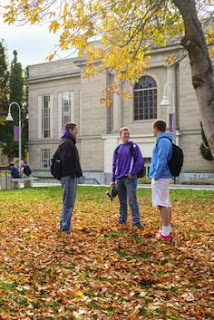Global Universities Supportive of LGBT
For her graduate studies, Thai national and transgender student Hua Boonyapisomparn chose Trinity Washington University in the U.S. Unsure how welcoming the campus was to lesbian, gay, bisexual and transgender students, she decided to visit the school to get a better feel for it.
Boonyapisomparn asked about the school's LGBT policies and whether transgender students are accepted. An admissions officer told her that "Trinity is a progressive campus," she says.
Depending on the university and its location, LGBT international students may experience varying levels of acceptance and support on campus. Knowing what to expect can make the global university experience more enjoyable.
For prospective LGBT international students, here are three criteria to look for when researching global universities.
1. LGBT-friendly university webpages: Some global university websites have content welcoming LGBT students, with specific emphasis on international students.
The University of Southern California's LGBT Resource Center website, for example, has a page dedicated to international LGBT students and provides links to its LGBT peer mentoring program, which is open to all students, and its monthly rainbow international lunches, opportunities to meet other LGBT international students.
At some universities, LGBT-friendly information can be found directly through the international student services webpage, such as at the University of Wisconsin—Madison, whose site includes a link to international LGBT support services in its resources section.
But just because a school may not have LGBT-devoted webpages doesn't mean students should write off the institution. Many schools, like Yale-National University of Singapore, have nondiscrimination polices on their websites promoting a safe environment for all students.
"All Yale-NUS students, staff and faculty are valued as equal members of the community, and are not only free but also encouraged to express their singular and/or intersecting social and personal identities on campus," said Sara Pervaiz Amjad, intercultural engagement manager at Yale-NUS, via email.
Some Canadian universities approved a bylaw last fall ensuring their institutions' policies are nondiscriminatory.
Boonyapisomparn recommends prospective LGBT international students contact or visit global universities in person and inquire about their policies. She says Trinity does not discriminate against students based on gender identity and sexual orientation.
2. LGBT support services: Some universities have dedicated LGBT centers and staff to support students. Cardiff University in Wales, for example, offers a variety of support services to LGBT students and staff, earning the school a top rating in the "Gay By Degree 2015" guide by Stonewall, a United Kingdom-based LGBT rights charity.
"We have an excellent counseling and well-being team that has someone specializing in gender identity and links to specific LGBT+ support," says Karen Cooke, organizational development manager and chair of the Enfys LGBT+ staff network at Cardiff.
Cooke says Cardiff has a number of staff in both the international and student services departments, including individuals who identify as LGBT, who are available to support and talk with LGBT international students.
She says the school also works closely with its residences team "to provide support and training so that LGBT+ students can be supported in their time in university accommodations."
While some universities may not have dedicated LGBT support staff, available student support services can still be useful. National University of Singapore doctoral student Mukul Prasad, who has not yet come out to his family in India, says he used NUS' counseling services.
"I was depressed after a string of bad dating experiences," he says. "The counselor was really good, and I did tell him about my sexual orientation and it was kept confidential."
Prasad says the school's "counseling services are excellent" and provide a support system for LGBT students at NUS. He calls the university "a rather safe space for us."
3. Political activism and awareness: Prospective international students can also look to a university's student groups and related social media presence to gauge its LGBT activism, which can measure LGBT presence and advocacy on campus.
Stefanie van Gelderen, marketing and communications adviser for international programs at the University of Amsterdam in the Netherlands, said via email that the school supports and partly finances "student initiatives aimed at bringing together LGBT students." These include groups like the A.S.V.Gay student association and UvA Pride, a platform for LGBT students. Both groups are on Facebook.
Canadian Ian Kenny, a gay grad student at the University of Amsterdam, says he chose the school and the Netherlands because both are open-minded and forward-thinking and that studying there "means getting involved with other like-minded people, whether on an activism side or in the classroom."
Amjad of Yale-NUS said that student LGBT groups like The G Spot host events on campus "to raise awareness around issues of diversity as well as provide support" for LGBT students at Yale-NUS and NUS. For example, The G Spot, which has a Facebook presence, held an event last fall to raise awareness of living with HIV in Singapore.
Trinity student Boonyapisomparn says while the university currently has no LGBT clubs, having an "openly accepting environment is very critical for the success" of LGBT students. She says this is especially true for LGBT international students who also have to adjust to a new culture.
“You will need to feel welcome, no matter how you identify," says Boonyapisomparn.
Anayat Durrani | Contributor


Comments